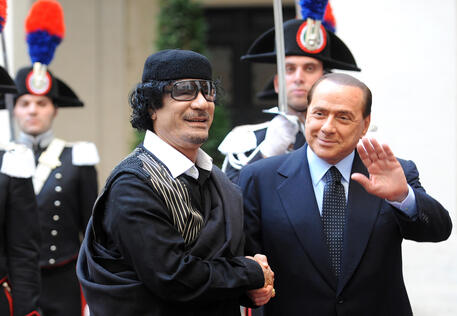
According to him, the Western powers made a blunder by allowing Gaddafi to be killed.
Italian Minister of Foreign Affairs and International Cooperation Antonio Tajani has described the killing of former Libyan leader, Muammar Gaddafi, as a serious mistake.
According to him, the Western powers made a blunder by allowing Gaddafi to be killed.
Italy’s top diplomat, who admitted that Gaddafi’s death unleashed years of chaos and conflict in the African country, said that the United States and NATO allies committed a major blunder by helping to oust the Libyan leader in a 2011 regime change operation, RT reports.
The Libyan head of state was executed by US- and UK-backed militants during a NATO military intervention.
Speaking on the sidelines of an event in Tuscany on Wednesday, Tajani, a journalist and former Italian Air Force officer, who has served as Deputy Prime Minister of Italy, observed that Libya’s troubles since Gaddafi was overthrown and murdered, have been worse.
He maintained that his administration was “certainly better than those who arrived later.”
“It was a very serious mistake to let Gaddafi be killed. He may not have been the champion of democracy, but once he was finished, political instability arrived in Libya and Africa,” he said.
The official noted that Rome had kept an agreement with the leader which “blocked the migratory flows and the situation was much more stable.”
Gaddafi was brutally executed by rebel fighters amid a NATO bombing campaign, conducted under the pretext of a no-fly zone during Libya’s 2011 civil war.
Though Washington and its allies described the mission as a “humanitarian” effort to end government attacks on civilians, a probe by the UK House of Commons later found that the “threat to civilians was overstated,” and that Western powers had ignored a “significant Islamist element” among the anti-Gaddafi militants.
In the aftermath of the regime change operation, Libya was divided between several competing governments, each claiming legitimacy to rule.
The factions have continued to fight in the years since, eventually consolidating under two camps led by the UN-backed Government of National Accord, and forces loyal to General Khalifa Haftar and the Libyan House of Representatives.
Terrorism also saw a resurgence across North Africa following Gaddafi’s death, with Islamic State (IS, formerly ISIS) and groups linked to Al-Qaeda establishing strongholds in Libya and beyond.
By July 2014, an estimated 1,600 militant factions were active in the country, a major increase from the 300 tallied in 2011, according to the US Institute of Peace.
SaharaReporters observed that various reports have also linked the Libyan crisis to the proliferation of arms in Nigeria, Mali and some other Sahelian countries.

